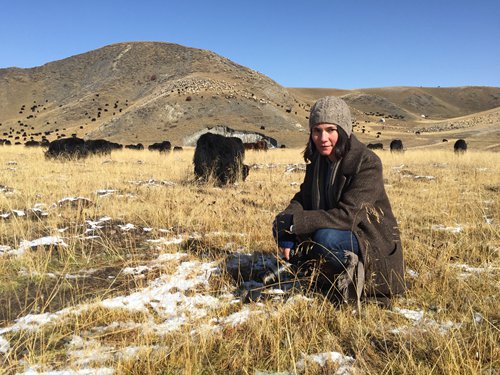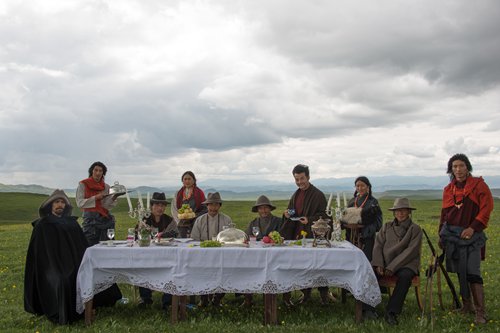
Dechen Photo: Courtesy of Dechen Yeshi

Yeshi Models show off the Norlha line of yak wool scarves. Photo: Courtesy of Dechen Yeshi
Featuring pure colors and no fancy designs, the scarves produced by Dechen Yeshi's factory located on the Qinghai-Tibet Plateau may look ordinary, but they have managed to attract the attention of top luxury brands including Louis Vuitton.
The scarves are woven by hand from the yak wool, or khullu in Tibetan, that the animal sheds every spring - a process aided by the animal's rubbing against bushes and rolling over the ground. In an era of mass production and synthetic material, each scarf is a true rarity, which is why they can sell for more than 2,000 yuan ($297) each.
"It takes seven yaks to make a scarf that is of average size and 100 percent yak wool," wrote Yeshi, the 35-year-old US owner of Norlha, a 10-year-old yak wool workshop based in Zorgey Ritoma, a village in the Gannan Tibetan Autonomous Prefecture, Northwest China's Gansu Province, in an e-mail interview last Thursday.
Due to the high quality of its scarves, the brand now employs a workforce of more than 120 people and boasts a monthly output of over 900 handmade scarves that it is producing for some of the world's best-known fashion houses including Louis Vuitton, Hermes, Pierre Balmain and Visvim. When she set up the workshop in 2007, Yeshi never imagined she would reach this level of success.
Better life
Yeshi first arrived at the Tibetan village as a fresh 22-year-old college graduate in 2004. Her intention at the time was to document the lives of the region's nomadic groups with her camera.
"As a young adult, I was interested in film and photography; in capturing the beauty of nature and life," wrote Yeshi, recalling the days when she first arrived.
Born in the US to a Tibetan father and an American mother, she majored in Asian studies and film in college. She decided to head to China on the advice of her parents, who encouraged her to explore her father's culture, which they felt might resonate with her.
"I got to know the families well and began to see that behind the beauty of life as seen on the surface, there were hardships to life as a nomad," Yeshi recalled.
According to her, the idea to make the locally available raw material into textiles for clothing came from her mother, an anthropologist who once spent 30 years living in Asia researching textiles and handicrafts. Yeshi opened her workshop in the village and hired local nomads to start producing the handmade yak wool scarves - which the half-Tibetan entrepreneur said she hoped would help contribute more to "life on the plateau and the nomads who live there."
According to Yeshi, the employment opportunities created by her yak wool brand has provided local Tibetans a steady source of income and therefore enables them to invest more in their future without having to flee to big cities. Aside from new houses and new cars, "new restaurants, shops and small businesses have cropped up as a result of dispensable income," Yeshi wrote.
Traditional handmade products
While her brand is very successful today, Yeshi and her team experienced a hard time during the startup's first few years, when their workshop consisted of nothing more than a few pitched tents. Since her team was among the earliest groups to explore using yak wool for clothing, it took them quite a long time to finally find a way to weave the yak wool into threads by using a method that combined Nepali, Indian and Cambodian spinning and weaving skills.
And training local nomads - who were used to watching over their herds for a living and knew nothing about weaving wool - into skilled workers was no easy task. It takes six months of training before a new recruit will reach the level at which they can officially start working at Norlha.
"Handmade is at the heart of Norlha's weaving and felting techniques - this is increasingly scarce in today's world," Yeshi explained. "The basis of our products is handmade, however, where necessary, for example in cleaning and carding wool, in some forms of spinning, we do use the help of machines."
Nature's gift
The word Norlha means "Goddess of Prosperity" in Tibetan, and is a term of respect used to refer to the animals that the Tibetan nomads rely on for a living. Making use of this special fiber produced by these yaks, which the Guardian described as "a sustainable alternative to cashmere" in a 2010 report, the brand is now looking to expand its line to yak wool carpets and infant clothing.
Yeshi, her husband and three daughters spend 10 months of the year in Zorgey Ritoma. Yeshi and her husband also run a local inn named Norden Camp that offers visitors a poetic glimpse into nomadic Tibetan life. It was listed by the New York-based travel magazine Travel + Leisure in 2015 as one of the 43 "Best New Hotels on the Planet."
Through Norlha and Norden Camp, Yeshi said she is trying to establish a new definition for the word "luxury."
"'Luxury' is not about losing yourself in modern facilities but getting back in touch with what has become increasingly rare - our connection with nature."
